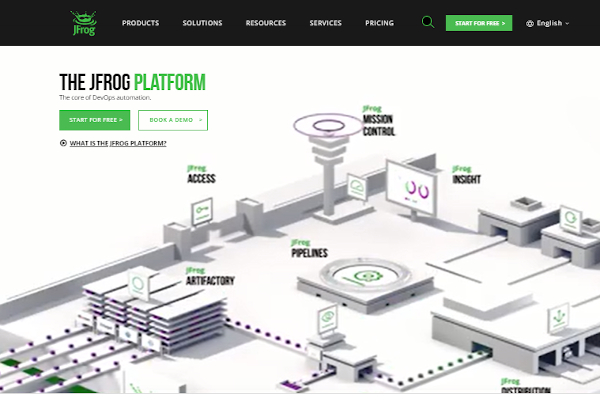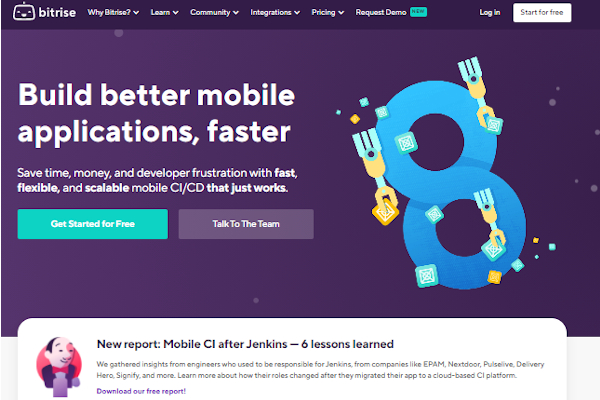The term “DevOps” refers to the practice of combining the efforts of two traditionally separate groups: programmers and system administrators. It allows them to speed up production and increase output. These organizations use DevOps methods through making use of state-of-the-art DevOps platforms and technologies. The adoption of automation, infrastructure-as-code, continuous integration, and testing is greatly facilitated by such platforms and technologies.
10+ Best DevOps Platforms Software
1. ReleaseIQ
2. CTO.ai
3. JFrog Platform
4. AutomatePro
5. Cloudsmith
6. Opsera
7. Prodly AppOps
8. Codefresh
9. AutoRABIT
10. Bitrise
11. Florum
What Is DevOps Platforms?
The phrase “DevOps software” refers to a specific category of development software that gives the IT staff of companies the ability to improve the communication process inside their own organizations. The application gives companies the ability to strengthen their internal telecommunication systems, which is especially useful when it comes to the process of creating new products.
Benefits
The use of DevOps software bridges the communication gap between software developers and operations staff. As a result, these groups are able to boost productivity inside the organization and provide superior software for all stakeholders. The program also comprises many tools from other applications that allow them to produce software for the firm. With these resources, programmers may reliably publish their project’s source code whenever it’s ready, streamlining the construction process and making it more rapid. Errors and security flaws in the code may be uncovered using the software’s source code management tools, preventing buggy code from being sent out to employees. The program offers collaboration capabilities that enable teams to interact efficiently that may give an open connection across the divisions of a corporation employing DevOps software.
Features
Tools for good planning should be included in DevOps software for developers. Developers need access to code management software solutions on the DevOps engineer versus software engineer platform to aid them in creating company-wide applications. Developers should be able to continuously test their software, even while it is being utilized by the business, with the use of testing software tools made available by the DevOps software developer resume platform. To help businesses better plan and execute on their software release schedules, deployment tools should be made available as part of the DevOps software development life cycle. The DevOps software engineer’s job is to provide the organization with monitoring tools that will help them find and gather information about any bugs or other issues in the software they are creating for their workers.
- Project Planning
- Code management software
- Deployment tools
- Application Testing
- Task monitoring tools
- Artificial Intelligence
- Big Data analytics
Top 10 DevOps Platforms
1. Testsigma
To provide the best possible DevOps solutions, Testsigma is a cloud-based test automation tool that works in tandem with your existing CI/CD systems.
2. QA Wolf
One well-known automated QA service is QA Wolf. By facilitating the concurrent execution of end-to-end tests, it aids in the reduction of the development cycle time.
3. Nagios
When it comes to monitoring important IT infrastructure, Nagios is the DevOps tool of choice.
4. JFrog
JFrog is a worldwide federated repository that makes it possible to do DevOps operations across several sites and replicate build artifacts.
5. Docker Hub
With over 100,000 container images from thousands of reliable suppliers, Docker Hub is the go-to place for containerized applications. It facilitates the use of containers for the development, administration, and deployment of software applications.
6. Jenkins
Jenkins is a popular and powerful DevOps platform. Jenkins jobs may be scheduled and monitored to do repeated operations including environment setup, binary deployment, and backup and restoration.
7. Codefresh
Codefresh is a system for continuous integration and continuous delivery (CI/CD) that automates the process of GitOps for cloud apps.
8. Kubernetes
Kubernetes is a platform for managing containerized applications at a large scale that is open source and developed by DevOps.
9. Ranorex Studio
For automating the testing of graphical user interfaces, try out Ranorex Studio. It may be used to test apps on desktop computers, the web, and mobile devices.
10. Azure DevOps
Azure DevOps is a collection of tools and services that enables teams to work together on the process of developing and deploying software.
FAQ
What kinds of software are there for DevOps platforms?
DevOps software aids users in managing DevOps projects with features like automated build and configuration management, as well as continuous deployment and integration.
How do DevOps platforms software operate?
Scrum is a methodology used by DevOps software that facilitates teamwork during the creation of a product or service. Kanban is an alternative technique that helps teams simply monitor their projects’ development. When it comes to responding to continuous development and fixing problems and defects, Agile is another strategy used by DevOps teams.
Is DevOps platforms software expensive?
Some DevOps tools provide unique pricing that grows in price as you go through the software’s subscription levels, while others start at $5 per month and go up to $899 per year or more. DevOps software costs differ from service to service and user to user. While expensive DevOps software may be overkill for smaller businesses, it may be worth the investment for larger enterprises.
There are many positive outcomes for teams when DevOps principles are used throughout all phases of development. It provides the impetus and focus necessary to grow rapidly and adjust to changing market conditions. As a consequence, you’ll be in a better position to produce outstanding outcomes for your company.
Related Posts
10+ Best Chemical Software for Windows, Mac, Android 2022
12+ Best Vulnerability Scanner Software for Windows, Mac, Android 2022
4+ Best Bundled Pay Management Software for Windows, Mac, Android 2022
10+ Best Trust Accounting Software for Windows, Mac, Android 2022
10+ Best Patient Portal Software for Windows, Mac, Android 2022
13+ Best Virtual Reality (VR) Software for Windows, Mac, Android 2022
12+ Best Bed and Breakfast Software for Windows, Mac, Android 2022
15+ Best Resort Management Software for Windows, Mac, Android 2022
14+ Best Hotel Channel Management Software for Windows, Mac, Android 2022
12+ Best Social Media Monitoring Software for Windows, Mac, Android 2022
10+ Best Transport Management Software for Windows, Mac, Android 2022
10+ Best Other Marketing Software for Windows, Mac, Android 2022
10+ Best Top Sales Enablement Software for Windows, Mac, Android 2022
8+ Best Industry Business Intelligence Software for Windows, Mac, Android 2022
10+ Best Insurance Agency Software for Windows, Mac, Android 2022











